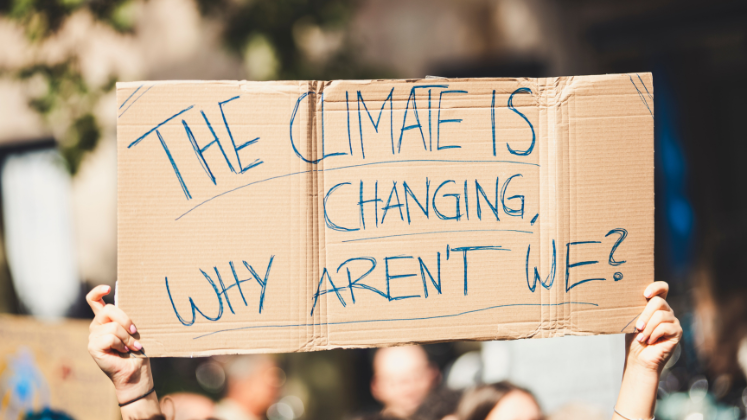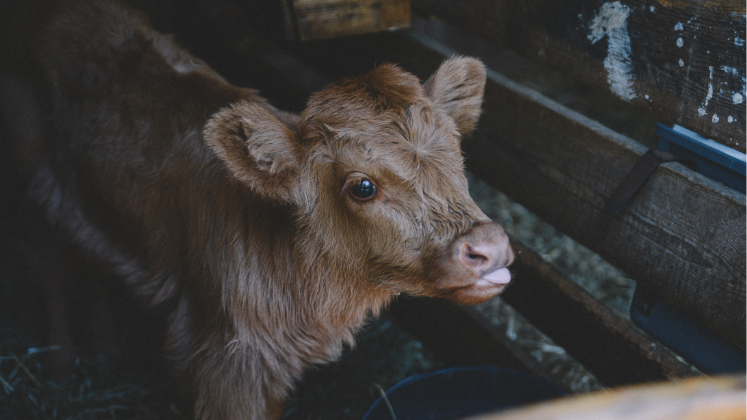 Meat and dairy are killing our planet, so why isn’t diet at the top of the menu in climate change negotiations? Heidi Zamzow (PhD student in the Department of Psychological and Behavioural Science) explores the impact that animal agriculture is having on the planet and the role of behavioural scientists in leading sustainable change.
Meat and dairy are killing our planet, so why isn’t diet at the top of the menu in climate change negotiations? Heidi Zamzow (PhD student in the Department of Psychological and Behavioural Science) explores the impact that animal agriculture is having on the planet and the role of behavioural scientists in leading sustainable change.
Animal agriculture is a leading cause of biodiversity loss and a primary driver of climate change and ecosystem degradation. In many countries, ruminant livestock are the main source of anthropogenic methane – a greenhouse gas over 100 times more powerful than carbon dioxide. But in case you think that simply switching from beef to chicken or pork is an easy way around the problem, think again: UK imports of soya for animal feed contribute to deforestation and habitat loss, leaving many iconic species on the brink of extinction and destroying critical carbon sinks in the process. To add insult to injury, both animal manure and fertilisers used to grow animal feed are a main source of nitrous oxide, an even stronger driver of atmospheric warming than methane. There’s no way around it: even if we adopt all other mitigation measures, we still can’t reach our emissions targets without dramatically reducing our consumption of meat and dairy.
A collective action problem
As we learned from Brexit and the pandemic, we are dependent on a global food system which involves complex and often obscure supply chains. Yet how many of us have terms like ‘global food security’ or ‘global methane budget’ top of mind when we are strolling through the supermarket aisles or sitting down at a restaurant to eat? Negative externalities are for the most part insidious and invisible, with both villains and victims heterogeneously dispersed. So despite livestock’s starring role in Garrett Hardin’s (in)famous essay on The Tragedy of the Commons – as well as the 1832 University of Oxford lecture which inspired it – we resist treating food choice as a commons problem. We are sovereign in our own homes, and the idea of the government intruding into our kitchens and dining rooms is an anathema to most of us.
Perhaps, then, it should be no surprise that any mention of sustainable diets is lamentably absent from national climate action plans. Yet government action is critical, not only to coordinate system change across industry, institutions, agencies and municipalities but also to ensure a just transition. And, after all, there is plenty of precedent for policies which place limits on our consumption. We already regulate practices formerly considered a private behaviour (e.g. smoking). We already regulate other carbon-intensive consumer goods (e.g., emission standards on vehicles). Indeed, we already regulate food (e.g. GMOs and sugar taxes). So why are we willing to accept policies which regulate what goes into our food but not the source of the food itself?
A critical role for behavioural science
As behavioural scientists, we have a critical role to play in addressing the climate emergency, but where should we concentrate our efforts? We find ourselves smack-dab in the middle of the bottom up vs top-down/behaviour change vs system change and, more recently, the ‘i-frame vs s-frame’ debate around whether focussing on individual-level solutions is misguided at best and irresponsible at worst. But is this a false dichotomy? For instance, might a better understanding of how policy support is influenced by factors such as perceived social norms or self-interested vs altruistic motivational states help catalyse system-level change?
Ideally, behavioural science can help facilitate supply-side and demand-side approaches that work together synergistically, rather than antagonistically. Research on interventions which are effective in changing individual behaviour can generate valuable insights to inform policy, such as what ratio of plant-based to animal-based offerings may be required to get consumers to make the switch. A shift in demand can in turn send a strong market signal that social norms are changing, which may embolden policymakers to take action. Additionally, consumers who have taken steps to change their diet may be more open to sustainable food policies. At the same time, leaders send a strong signal to their constituents through the laws and regulations they propose, and when producers see a change in policy coming, they are likely to adjust their business model to comply even before it is enacted.
At this critical juncture, perhaps the highest and best use of psychological and behavioural science is identifying ways to strengthen and complement, rather than replace, the more traditional ‘hard’ policies required to achieve the rapid transition we so urgently need.
Zero-sum game or win-win?
Shifting dietary norms needn’t be a trade-off between individual and societal interests. Co-benefits of changing the food system include, among other things, cleaner air, restored waterways, and a safer drinking water supply. A move away from industrial animal agriculture would also significantly reduce the risk of antimicrobial resistance and zoonotic diseases, helping to prevent future pandemics. But plant-based diets offer a myriad of individual health benefits as well, which in some estimates could equal or even exceed environmental benefits, particularly in developing countries. Avoiding animal-based foods can help ward off cardiovascular disease, stroke, diabetes, cancer, obesity and more – not only adding years to your life but life to your years. In fact, a growing body of research suggests that framing diet change as promoting ‘personal and planetary health’ may be a more effective strategy than focussing on one or the other.
As much as our current food system acts as a threat multiplier, transforming it could be a ‘solution multiplier’, simultaneously addressing at least half of the Sustainable Development Goals. As Dr. Albie Miles of the University of Hawai’i says, ‘If we get food right, we get everything right.’
There is reason for hope. For the first time, there will be a food systems pavilion at this year’s UN Climate Change Conference, following on the UN Food System Summit held in September 2021. But we are running out of time. We need to move discussions about dietary change from the periphery to the centre stage. Neither interventions which target individual action nor market mechanisms on their own will be enough. We need strong policies to accelerate the transition to more sustainable dietary norms. In the end, averting ecological catastrophe may hinge on whether policymakers and consumers alike can come to see that what we put on our plates is not purely a personal choice, but a common good.
Notes:
- The views expressed in this post are of the author and not the Department of Psychological and Behavioural Science, nor LSE.
- Image sourced from Alamy.




